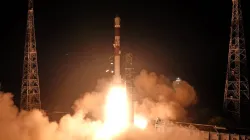Space Docking Mission: Successful orbit injection achieved for upcoming ISRO docking experiment
Currently, the two spacecraft will move 20 kilometers apart, and then the docking process will begin. According to the space agency, docking is expected to take place around January 7.

The Indian Space Research Organisation (ISRO) has successfully launched two spacecraft that will help demonstrate a vital technology for future space missions known as space docking. This was announced after the spacecraft were separated and placed in their intended orbit on Monday.
Mission Director M Jayakumar stated, "The PSLV C60 mission has successfully achieved its goals." ISRO chief S Somanath confirmed that the rocket placed the spacecraft in a circular orbit about 475 kilometers above Earth, slightly higher than the target of 470 kilometers.
Somanath explained that once the two spacecraft, named SpaDe bit farther apart—about 20 kilometers—they will begin the docking process. He expects this docking to happen around January 7. A significant part of this mission includes an experiment called POEM-4, which carries 24 payloads from startups, educational institutions, and ISRO itself, set to launch the next morning.
He noted that scientists would be working overnight to ensure POEM-4 reaches the right orbit for its operations. In total, the two SpaDeX satellites weigh 220 kilograms each. POEM-4 will carry out experiments for two months after being attached to the fourth stage of the rocket.
Somanath mentioned that scientists will conduct various operations starting December 31 at ISRO’s center in Bengaluru, where they will monitor the docking process, including live transmissions from the spacecraft's cameras.
He expressed pride in this achievement, highlighting its importance for future missions, including potential human space flight and plans for a space station. He assured that this is just the beginning for space docking missions and that more advanced versions are expected in the future.
Surendran, the project director, praised the PSLV team's success in launching two missions in the same month, which is a record. He also confirmed that the spacecraft had successfully deployed their solar panels and were now oriented towards docking, expected to happen in the first week of January.
Overall, this PSLV-C60 mission marks a significant milestone for ISRO and positions India among a select few countries capable of such technology, laying the groundwork for future space exploration, including missions to the Moon and beyond.
ALSO READ: Black Moon explained: Here's what it is and how you can watch this special celestial event
